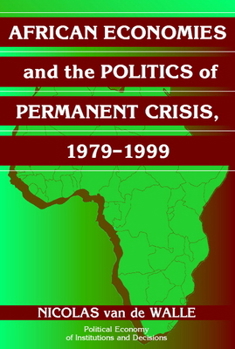African Economies and the Politics of Permanent Crisis, 1979-1999
(Part of the Political Economy of Institutions and Decisions Series)
Select Format
Select Condition 
Book Overview
This 2001 book explains why African countries have remained mired in a disastrous economic crisis since the late 1970s. It shows that dynamics internal to African state structures largely explain this failure to overcome economic difficulties rather than external pressures on these same structures as is often argued. Far from being prevented from undertaking reforms by societal interest and pressure groups, clientelism within the state elite, ideological factors and low state capacity have resulted in some limited reform, but much prevarication and manipulation of the reform process, by governments which do not really believe that reform will be effective, which often oppose reforms because they would undercut the patronage and rent-seeking practices which undergird political authority, and which lack the administrative and technical capacity to implement much reform. Over time, state decay has increased.
Format:Paperback
Language:English
ISBN:0521008360
ISBN13:9780521008365
Release Date:September 2001
Publisher:Cambridge University Press
Length:306 Pages
Weight:0.80 lbs.
Dimensions:0.8" x 6.0" x 9.0"
Customer Reviews
2 ratings
Best Book on African Development for Many Years
Published by Thriftbooks.com User , 20 years ago
The Politics of Permanent Crisis is simply one of the best books on contemporary Africa to come out for ages. The author, who has been writing sensibly on Africa, political reform, and foreign aid issues for many years, takes on a whole range of often contradictory academic work to help explain why Africa has been unable to grow faster despite increasingly levels of external financial assistance. Van de Walle argues coherently that local politics within many African countries have combined with donor practices to militate against the fundamental changes required for African economies to take-off. Seen in this light, the lack of reforms and disappointing outcomes from foreign aid in Africa are not mysteries, but rather the logical outcomes of the incentives under which the various players operate. This is a seminal contribution to our understanding of Africa's economic and political dilemmas -- and an excellent complement to Bill Easterly's "The Elusive Quest for Growth". If there is any shortcoming in the book, it is a minor quibble that van de Walle seems too dismissive of the role of individual leaders in sparking recovery (e.g., surely, Jerry Rawlings and Yoweri Museveni deserve some personal credit for turning Ghana and Uganda around). This book is a must-read for anyone interested in Africa's development challenges and the role of the international community.
The Puzzle of African Exceptionalism
Published by Thriftbooks.com User , 20 years ago
Nicolas van de Walle's prize-winning book explains the puzzle of African exceptionalism with an intelligent and nuanced framework. Focusing on the politics behind the seemingly permanent crisis, van de Walle explains the pervasive rise of neopatrimonial rule on the continent -- a political system that depends on patronage and clientelism, and which is a feature of many low-income, largely subsistence-based polities around the world. Van de Walle's dual training in economics and political science, and his extensive experience living and working in many of the countries of the sub-continent, make this book deep, broad, and credible. I've recommended it to many who want to understand what is behind their t.v. screens: why has poverty grown in Africa? Why is this the region most troubled by small-scale political wars? Its scholarly but accessible style, complimented by extensive footnotes and references, also make this an excellent book for students.





